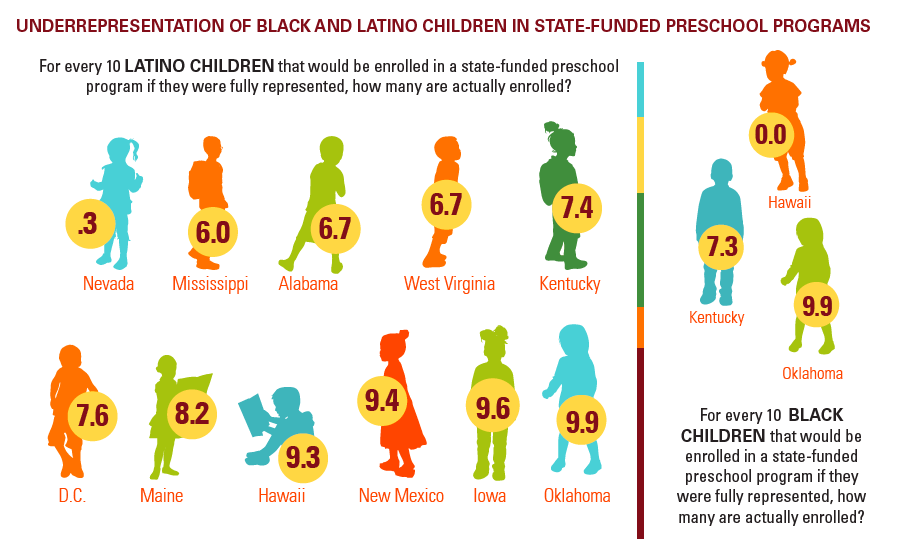The Education Trust recently issued a new report, Young Learners, Missed Opportunities. Subtitled “Ensuring That Black and Latino Children Have Access to High-Quality State-Funded Preschool,” it highlights ways that states are, by and large, failing to deliver on the potential for getting 3- and 4-year-olds of color ready for kindergarten. The report and its accompanying online tool also offer specific ideas for advocates to promote access.
A nonprofit advocacy organization devoted to closing opportunity and achievement gaps, the organization is led by John B. King, Jr., who previously served as U.S. Secretary of Education. In addition to analyzing data, it shares tools, convenes advocates and builds partnerships to promote five priorities: quality, access, workforce diversity, programmatic coordination and better, more actionable data, especially with regard to race and ethnicity.
“The news is not good,” summarized Carrie Gillispie, the author of the new report, whom I met just days before she went on maternity leave. How bad is it? In the 26 states where there was enough data on 3- and 4-year-olds to analyze, only 1 percent of Latino children and only 4 percent of Black children were enrolled in high-quality state-funded preschool programs.
What do they mean by “high-quality”? The benchmarks used come from the National Institute for Early Education Research (NIEER) at Rutgers University, and they describe what Gillispie considers to be “a bare minimum—a floor, actually.”
- Comprehensive Early Learning and Development Standards that are horizontally and vertically aligned, supported and culturally sensitive
- Supports for Curriculum Implementation
- Lead Teacher Degree (BA)
- Lead Teacher Specialized Training in ECE/CD
- Assistant Teacher Degree (CDA)
- 15 hours/year of professional development, individualized plans professional development plans, and coaching for lead and assistant teachers
- Maximum Class Size (20)
- Staff-Child Ratio (1:10)
- Screenings & Referrals
- Continuous Quality Improvement System
👉 Read NIEER’s Special Report: Supporting Teachers in State-Funded Preschool
The report describes the State of Georgia as a bright spot, though Gillispie hastens to add that this is only relative. More than 60 percent of the state’s substantial number of Black and Latino 4-year-olds are enrolled in state-funded pre-K, and its program meets 8 of 10 of NIEER’s quality benchmarks. She credits Georgia’s use of the Pyramid Model, as developed by Vanderbilt University’s Center on the Social and Emotional Foundations for Early Learning. In addition, Georgia allows for a range of settings—not just public and private elementary and secondary schools but also Department of Family and Children’s Services offices, Head Start sites, military bases and faith-based organizations—versatility that allows for families’ varied needs.
The picture is mixed in the District of Columbia, which enrolls essentially all of its Black 3- and 4-year-olds and 61 percent of its Latino 3- and 4-year olds—quite high on the “access” scale, but the nation’s capital rated only 3 out of 10 for quality, a finding that Gillispie says might be due to poor reporting. “Data counts,” she says. “Not knowing is not okay.”
A key takeaway is the persistent gap between the research on what works and the political will—nationally and at the state level—to implement best practices. “When it comes to ECE funding,” she says, “it’s how much and how well.” Sometimes, when you add up the federal, state and municipal budgets, it can seem like a lot of money, but it’s not deployed in a way that would most effectively close the education gaps that, research tells us, are likely to persist throughout a child’s education.
Gillispie emphasizes the value of policy makers listening to families and practitioners. “It’s so valuable to have them tell their stories. They are the experts,” she affirms. Failing to listen can result in policies that sound great but don’t work in practice. As an example, she mentions that, while it’s true that the bachelor’s degree correlates with effectiveness, mandating a BA is misguided without the supports needed to make higher education accessible. The Education Trust recently collaborated with the National Association for the Education of Young Children (NAEYC) on a focus group to discover the needs of educators of color.
👉 Read more from Early Learning Nation: Survey Shows Teacher Support for a Unified System of Early Childhood Education
Data sharing is another area that needs improvement. “The data live in different places,” Gillispie says, “which makes it hard to obtain all the relevant information on a child’s background and issues.”
Naturally, having the birth of her first child come so soon after the release of her first paper for the Education Trust has brought home for her the disparities of her home state of Maryland and all over the country. “I have a lot of advantages that other moms don’t,” she reflects, “but I still find the system frustrating.”

Mark Swartz
Mark Swartz writes about efforts to improve early care and education as well as developments in the U.S. care economy. He lives in Maryland.




